One of the most beloved characters in the Star Wars universe is the droid R2-D2 (affectionately called R2 or Artoo by friends). Star Wars creator George Lucas came up with the name while shooting his first feature film, American Graffiti. He was dozing while working on the Star Wars script when he was awakened by the sound editor loudly calling for R-2-D-2, an abbreviation for “Reel 2, Dialog 2.” Lucas thought it was a “great name,” and went back to the script with R2-D2 fresh in his head. And the rest, they say, is movie history — Artoo and droid companion C-3PO are the only characters to appear in every single Star Wars film so far.
CoQ10 also sounds like it could be the name of a Star Wars droid. But, in fact, it’s a critical nutrient for your health. While it doesn’t quite roll off the tongue like R2-D2 or C-3PO, CoQ10 does serve many crucial functions in its universe — in this case, your body — with many more likely to be discovered by future research. Many health influencers swear by CoQ10 to combat fatigue, and test-tube science suggests that it can play a role in preventing cancer, heart disease, and Alzheimer’s.
But what’s the truth about CoQ10? How much do we need? Do we need to supplement CoQ10, or eat animal products to get it — or can we get enough from a healthy plant-based diet? And what does its strange droid-like name stand for?
What Is CoQ10?
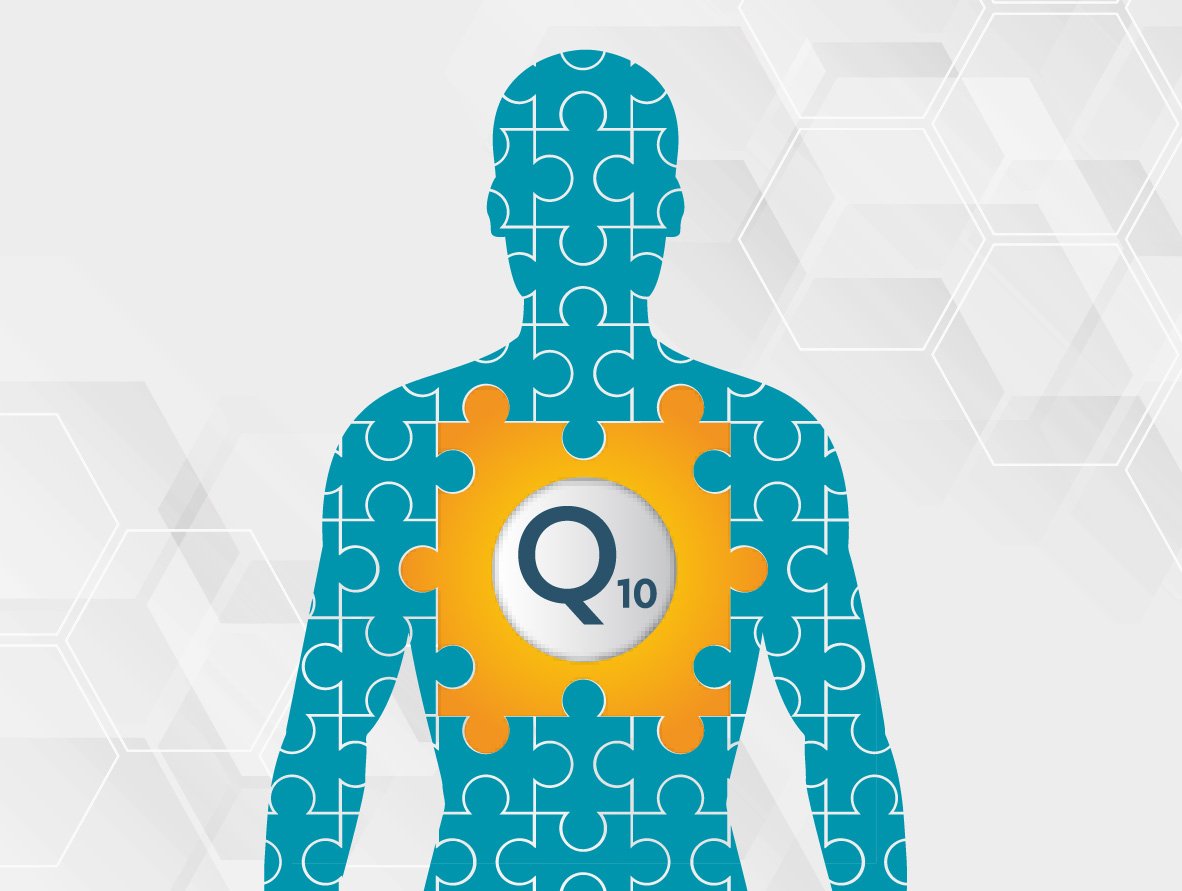
CoQ10 or coenzyme Q10 is a fat-soluble compound that’s naturally synthesized by the human body. The name describes its function and structure. The “Co” is short for coenzyme, meaning a molecule that helps enzymes do their jobs. (Enzymes are basically proteins that enable and speed up chemical reactions in cells.)
The “Q” represents quinone, which is a class of organic compounds that have a definition that makes my eyes cross: something about double bonds and a cyclic structure. That’s why another name for CoQ10 is ubiquinone, short for “ubiquitous quinone,” since the stuff is found working all over the place. And the 10 denotes the length of the chemical tail attached to the quinone circle. If this is a little confusing, hang in here with me for a moment.
CoQ10 serves two roles in the body: as a coenzyme supporting cell growth and energy, and as an antioxidant that protects cells from damage. As a coenzyme, it works with enzymes that perform a host of essential functions, including turning carbohydrates, fats, and proteins into energy; metabolizing cholesterol; maintaining a healthy pH range in cells; and shuttling inorganic sulfur into amino acids — among many others.
One way to think about CoQ10’s role in metabolism is to view the human body as a big, squishy battery: a storage unit for energy. In the mitochondria, the power plants of your cells, CoQ10 participates in processes that transfer electrons from one molecule to another, which creates an electrical charge that the cell can use to do work.
As an antioxidant, CoQ10 protects cells by tamping down excess inflammation, blocking a process of cell death called ferroptosis (not the same as being nibbled to death by a ferret; I looked it up), and inhibiting the ability of free radicals to “steal” electrons away from lipid molecules in cell membranes. It’s this damage that’s often responsible for disease and premature aging. For this reason, plasma levels of CoQ10 are sometimes used in studies as proxies for levels of oxidative stress.
The highest levels of CoQ10 in your body are found in your heart, liver, kidneys, and pancreas — all organs with high rates of metabolism.
How Much CoQ10 Do You Need?
Because all animals, including you, can make CoQ10, it’s technically not a vitamin, since you don’t need to ingest it. You can also get it from food, and from supplements. The question is, do most people need to pay attention to their CoQ10 levels?
The problem is, we really don’t have strong data to tell us how much a person should have in their blood. There are some rare genetic conditions that undermine endogenous (made in the body) CoQ10 synthesis and create a true deficiency, so we know what extreme lack of CoQ10 looks like: seizures, lack of muscle control, poor balance, intellectual disability, poor muscle tone, vision and hearing loss, and many other neurological disturbances; as well as kidney dysfunction and enlargement and weakening of the heart muscle.
For people with a serious CoQ10 shortfall, it’s clear that supplementation is crucial to their health outcomes. But for the rest of the population, it isn’t that clear. One unanswered research question concerns how much the CoQ10 you consume from food (or supplementation) actually contributes to the concentrations of the nutrient in your tissues. It’s been estimated that consumption contributes to about 25% of plasma CoQ10, but there are currently no specific recommended daily intake benchmarks. It does appear that the CoQ10 we get from food (or supplements) becomes more important with aging, as endogenous production slows down with your advancing years.
Where Can You Get CoQ10?
Given that CoQ10 plays such an important role in two processes crucial for life — energy production and cell defense — and that food containing it delivers a quarter of the total amount in your body, it makes sense to pay some attention to dietary sources.
CoQ10 Foods
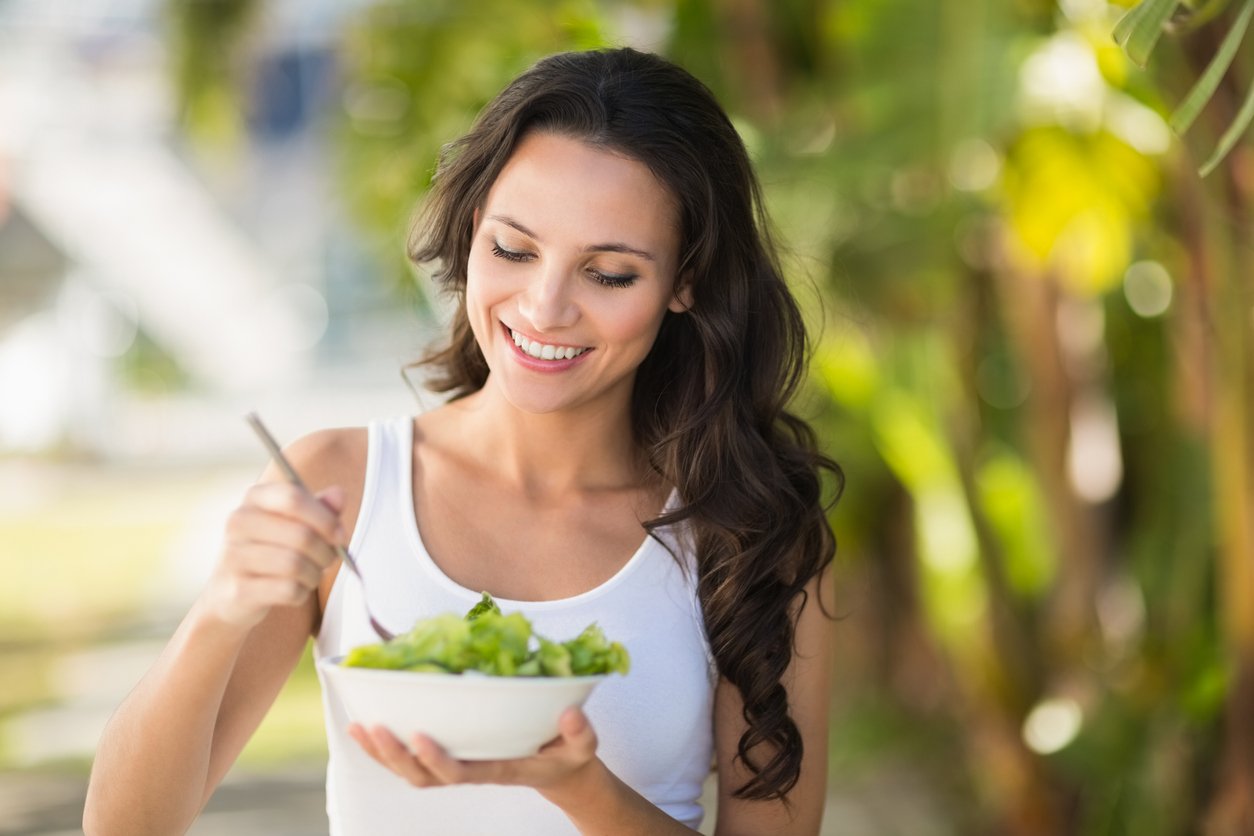
The most commonly cited dietary sources of CoQ10 include oily fish (such as salmon and tuna), organ meats (such as liver), red meat (beef or pork), dairy, and eggs. But these sources also serve up large helpings of unwanted health and environmental effects. They may also come from factory farms, which perpetuate cruelty to animals.
And in an ironic twist, these animal-based foods can cause the very inflammation and oxidative stress that CoQ10 combats, thus pretty much negating most of its potential positive effects.
The good news is, there are a number of less-heralded vegan sources of CoQ10 that can deliver plenty for most people. Plant-based foods that contain CoQ10 include whole grains, nuts and seeds, soybeans, and other legumes (and their oils).
CoQ10 Production via Photosynthesis
But there’s a weird new twist to the CoQ10 story, one that turns one of the central tenets of biology on its head. You know how plants can photosynthesize, right? They just hang out in the sun and let their chlorophyll perform this amazing feat of turning rays into food. I’m probably not the only person who’s ever lain on a beach and fantasized about being able to create my own energy while relaxing.
Well, it turns out I can. And so can you.
When you eat greens, that chlorophyll enters your body and travels throughout your bloodstream. And even if you consider yourself an international person of mystery, you’re a lot more transparent than you think. Literally. When you’re exposed to sunlight, it penetrates your skin and activates the chlorophyll you’ve consumed.
So when you go outside on a sunny day, and you have greens coursing through your body, that chlorophyll is still photosynthesizing. And one of the things it synthesizes is — you guessed it — CoQ10. So eating your green veggies and getting sunlight on a regular basis appears to be one of the main ways you can regenerate your CoQ10 supplies.
If you’re looking to absorb more CoQ10 from food, keep in mind that it’s a fat-soluble compound, so it’s better absorbed when eaten with a meal that includes a healthy, whole food source of fat.
What About CoQ10 Supplements?
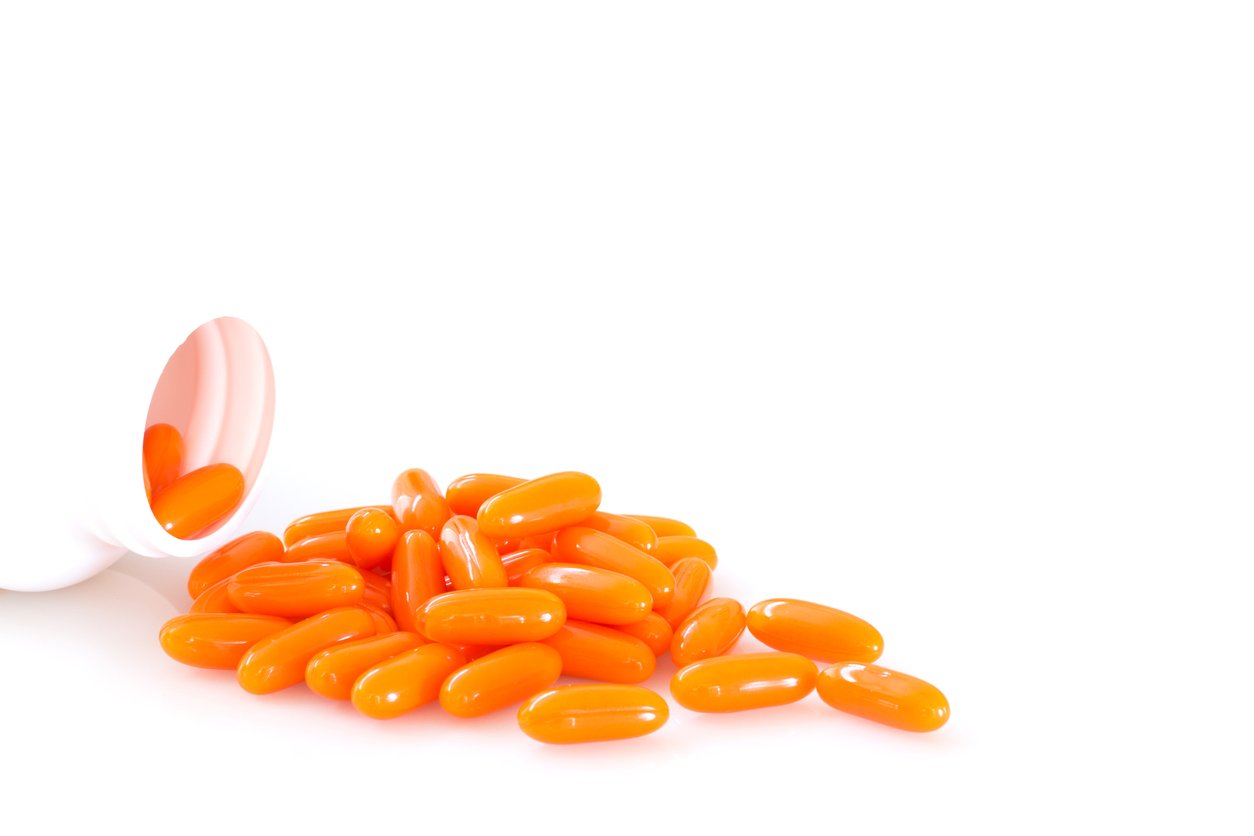
Many supplement manufacturers and wellness influencers assert that most people are subclinically deficient in CoQ10, and point to symptoms such as poor recovery from exercise and general lethargy as indications that supplementation is necessary to restore full vigor.
Some point out that cholesterol-lowering statins, one of the most commonly prescribed classes of drugs in the world, can interfere with CoQ10 synthesis. Some researchers have gone so far as to theorize that low tissue levels of CoQ10 might be the cause of muscle pain as a statin side effect.
So far, though, science has not borne out these claims for the general population — that is, anyone who does not suffer from a genetically-based inability to synthesize CoQ10.
It’s a toss-up whether statin users get relief from muscle pain by taking CoQ10. A 2018 summary of research noted that the existence of such an effect “remains unclear.” A meta-analysis from the same year was more optimistic; after looking at 12 randomized control trials involving over 500 participants, the researchers found that “CoQ10 supplementation may be a complementary approach” to manage muscle pain caused by statin use.
Evidence is lacking for CoQ10 supplementation for athletes, however; in some studies, cyclists improved their performance more while taking placebos than consuming CoQ10.
Who Might Benefit from CoQ10 Supplementation
There are circumstances when CoQ10 supplementation may be helpful. First, we don’t know if the age-related decrease in CoQ10 contributes to the aging process. The decline in production is very large: most people’s levels drop about 50% from age 25 to 65. Does aging cause the drop, or does the reduction in CoQ10 contribute to aging, or is there some other factor that causes both? Further complicating the issue: it’s not clear how CoQ10 levels in the blood correlate with CoQ10 levels in the tissues where it does its work.
One situation where CoQ10 supplementation might be helpful is for breast cancer patients who are taking a drug called doxorubicin. Studies tell us that doxorubicin may significantly improve breast cancer survival rates. Unfortunately, it can cause serious side effects in up to 20% of patients, including congestive heart failure and liver problems. There’s reason to hope that CoQ10 can prevent some of those side effects. Studies are ongoing, and there’s nothing conclusive yet — but it looks like CoQ10 might be helpful here.
CoQ10 supplementation may also be a boon for people with certain nutritional deficiencies or absorption disorders. Vitamin B6, for example, is a crucial player in making CoQ10. If someone has trouble absorbing B6 from food, they might want to take some extra CoQ10 to make sure they have enough in their body.
People with certain genetic defects or mutations involving CoQ10 may also want to consider supplementation. Those suffering from MRC enzymatic deficiency will also have low CoQ10 levels. In fact, diagnosis of MRC complex may be the earliest indication of a genetic inability to synthesize or activate CoQ10.
And there may be other conditions — that either impair the creation of CoQ10 or cause its depletion — that may also respond favorably to CoQ10 supplementation.
Potential Side Effects of CoQ10 Supplements

Just because CoQ10 is a hugely important molecule for human health doesn’t mean that there are no risks involved in taking it in supplement form. Like any substance, it may have unintended and unwanted consequences.
CoQ10 may interfere with the anticoagulant (blood thinner) warfarin; there are case reports of patients who stopped responding to warfarin treatments after beginning a CoQ10 regimen. It may have a similar effect on insulin when taken as a diabetes drug, as well as in some cancer treatments.
CoQ10 supplements can trigger side effects in some people, including headaches, nausea, and insomnia. You can minimize the headaches and nausea by breaking up the daily dose into several smaller doses taken hours apart. And you can reduce the insomniac effects by avoiding it in the hours right before bed, and keeping your daily dose under 100 mg.
In most cases, fortunately, CoQ10 supplementation is well tolerated, even up to 1,200 mg/day.
CoQ10 vs Ubiquinol
CoQ10, also called ubiquinone, exists in another, more active form. Known as ubiquinol, it gets absorbed 3–4 times more efficiently than ubiquinone. Both CoQ10 and ubiquinol are typically taken in a dose of 50–200 mg/day by those not suffering from a genetic condition that compromises CoQ10 synthesis or activity. For people with such a defect, or who have low levels of CoQ10 due to mitochondrial dysfunction, higher doses of 1,200–2,400 mg/day may be required to produce improvements in cell function.
Recipes to Naturally Regenerate Your CoQ10 Levels
You can support your body’s natural coenzyme Q10 concentration with these delicious and nutritious CoQ10-filled recipes. Toasted Pistachio and Cherry Overnight Oats features pistachios which are one of the richest plant-based sources of CoQ10 (and also provide a complementary source of healthy fat). These oats are fruity, nutty, creamy, and jam-packed with a ton of antioxidant-rich ingredients, which aid CoQ10 in its oxidative stress-fighting capabilities.
Orange Lentil Soup with Anise and Coriander is a sophisticated dish that will entice your senses, fill you with powerful plant nutrients, and keep your cells thriving.
Sweet Chili Broccoli and Tofu Stir-Fry is a CoQ10 twofer! Crispy tofu and tender broccoli are natural plant-based sources of CoQ10. Spoon over your favorite grain for an energy-rich plant-based meal that is simply delightful.
1. Toasted Pistachio and Cherry Overnight Oats
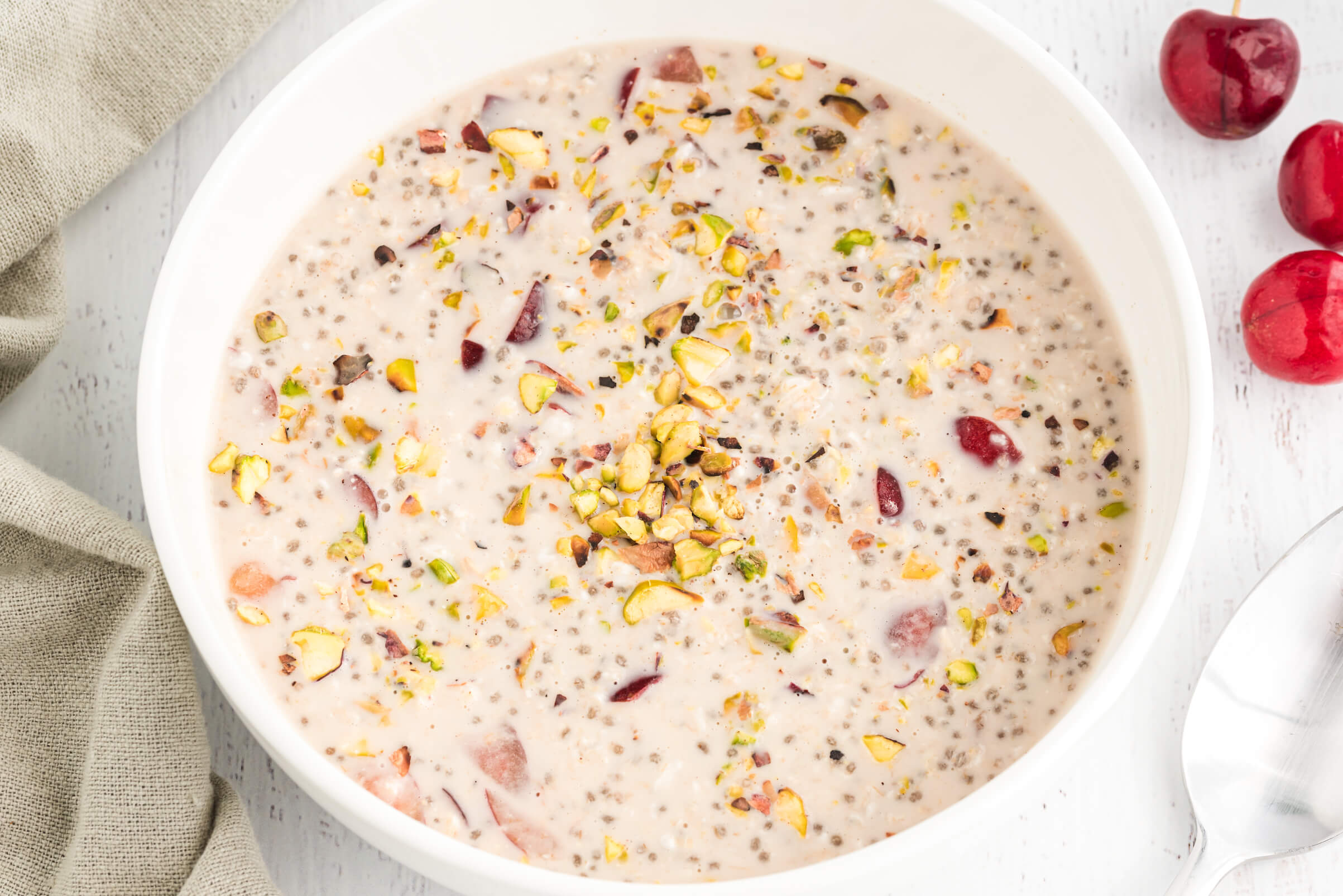
Pistachios are one of the richest plant sources of CoQ10. These delicious nuts are also a potent source of vitamin E (among other vital nutrients). Together, CoQ10 and vitamin E positively influence one another and are both essential for reducing oxidative stress (inflammation) due to their antioxidant activity. Toasted Pistachio and Cherry Overnight Oats provide a tasty way to get a healthy dose of both nutrients. Oats, cherries, and chia seeds also offer a great deal of fiber, protein, healthy fats, and even more antioxidants from the cherries, making this dish a nourishing breakfast that provides long-lasting energy and supports health.
2. Orange Lentil Soup with Anise and Coriander
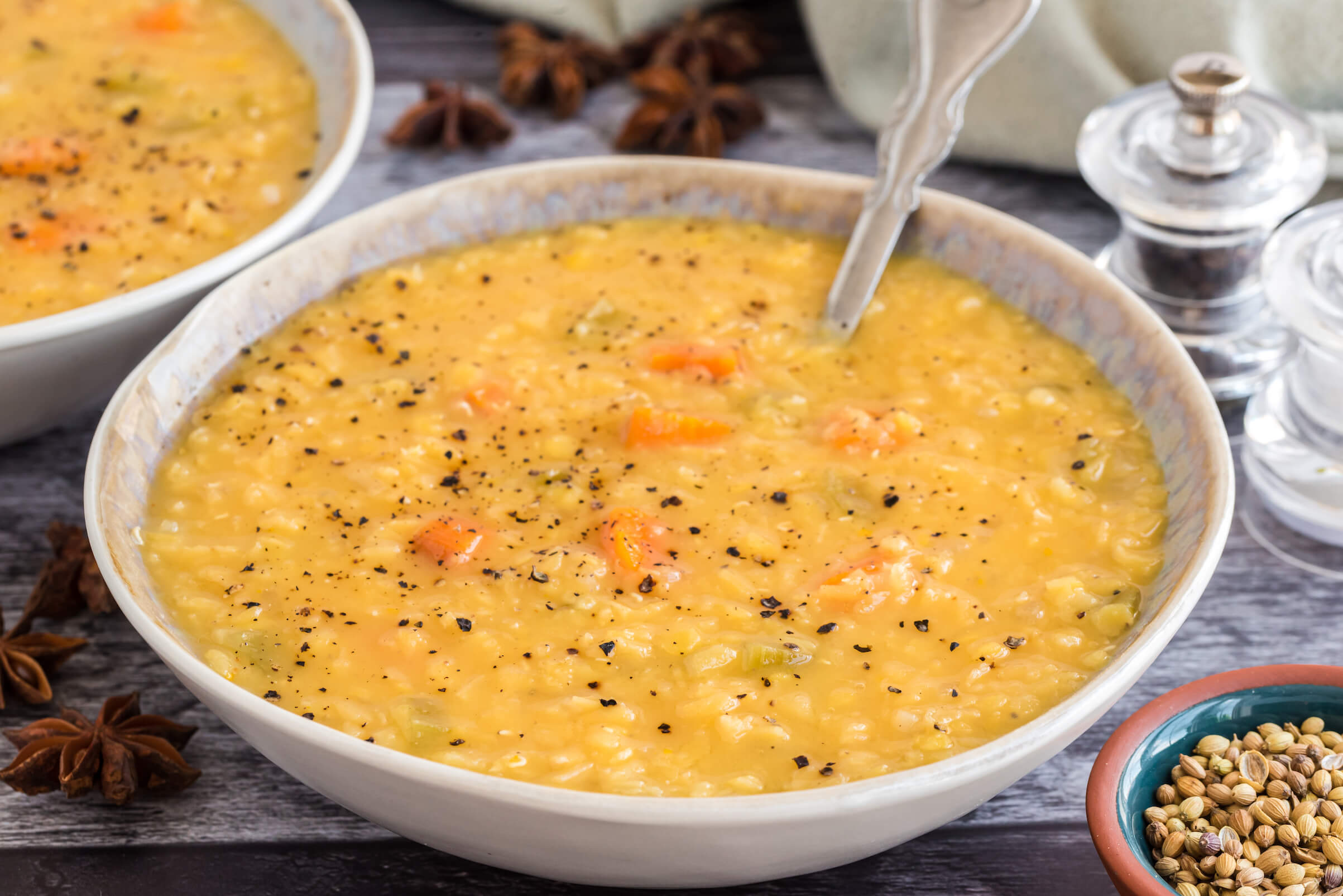
Wondering how Orange Lentil Soup with Anise and Coriander fits into the CoQ10 equation? Aside from lentils’ protein and phytonutrient-rich content, they also provide a natural source of CoQ10. When consumed with vitamin C-rich foods, in this instance, orange juice (which also has trace amounts of CoQ10), CoQ10’s antioxidant activity is activated and helps to reduce oxidative stress on the cells. Additionally, this heavenly aromatic soup creates beautiful aromas and unique flavors. Spices like anise and coriander offer tons of flavor, as well as nutrition, to plant-based dishes. Herbs and spices also boost the flavor and nutritional value in combination with fruits and vegetables. Enjoy this soup knowing you’re taking in generous amounts of fiber, vitamins, minerals, and phytonutrients, all while supporting your natural CoQ10 function!
3. Sweet Chili Broccoli and Tofu Stir-Fry
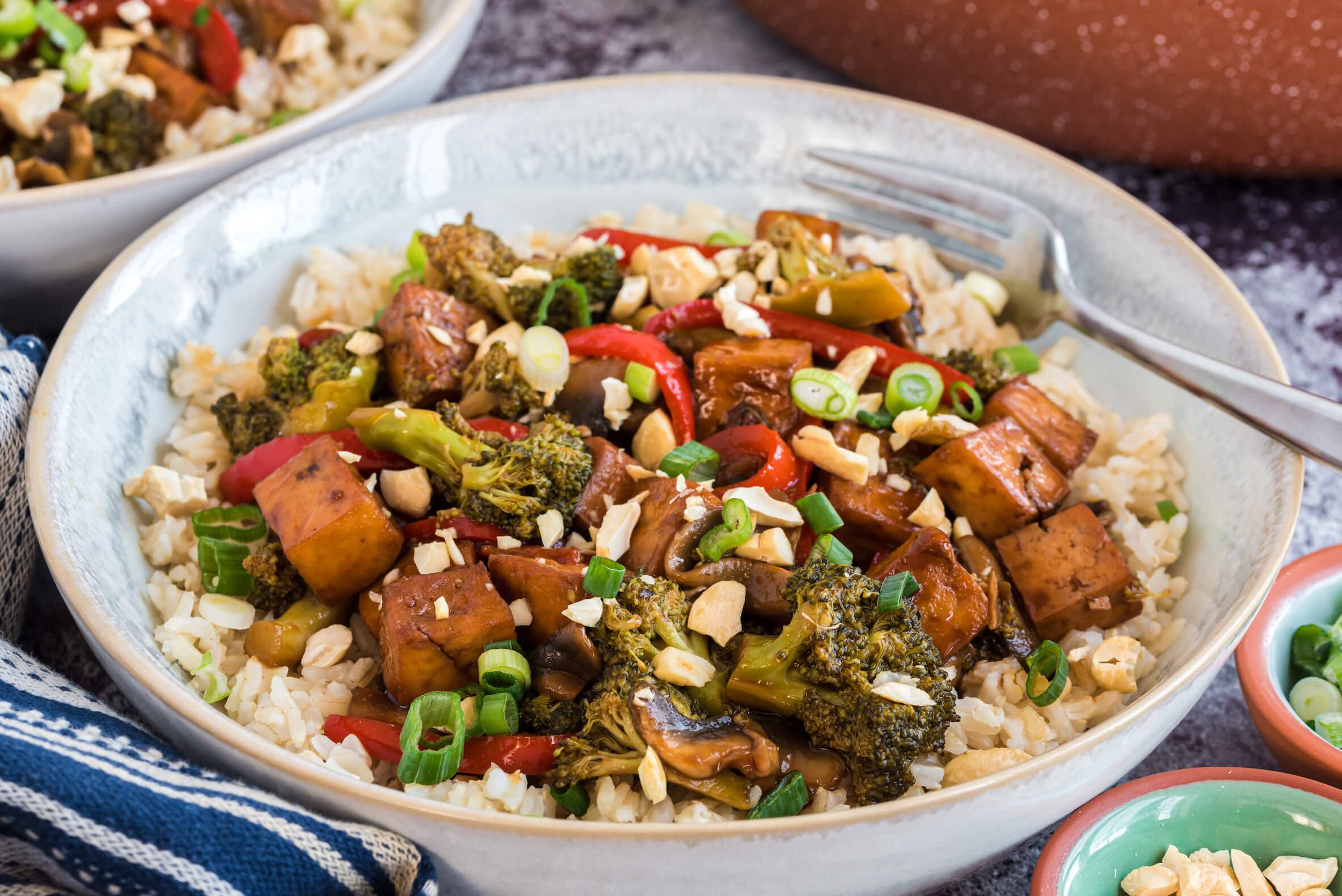
This tasty stir-fry is a CoQ10 twofer! Crispy tofu and tender broccoli are naturally high plant-based sources of CoQ10. Tofu has 1.2 milligrams per 100 grams, while broccoli contains at least 0.6 milligrams per 100 grams. Since CoQ10 is fat-soluble, be sure to add the cashews (or another healthy source of dietary fat — see Chef’s notes for ideas!) in this recipe to help your cells absorb as much as possible. Sweet Chili Broccoli and Tofu Stir-Fry has plenty of additional nutrition thanks to its essential minerals like calcium, iron, and selenium, as well as tons of phytonutrients, antioxidants, fiber, and protein. This CoQ10 recipe is a one-stop shop for eating to fuel cellular health and fight disease.
Natural CoQ10 Is the Best Form
CoQ10 is a naturally occurring chemical that exists in almost every cell of the body and is important for cellular function. The mitochondria in our cells rely upon it for the conversion of calories into a compound that cells use for energy. Its antioxidant activity also makes it vital for disease prevention.
Since we make our own CoQ10, it’s not clear how much we need to take in via food. It’s currently believed that most people can get enough CoQ10 from food to support the body’s endogenous production, although the amount needed has not been defined. And unless you take certain medications or have certain diseases or health conditions, you probably don’t need to supplement it.
Older people may want to talk with their health care provider to decide if a lab test might be helpful and if supplementation with CoQ10 is recommended since levels of CoQ10 do tend to decrease with age.
Tell us in the comments:
- What have you heard in the press about CoQ10?
- What did you learn about CoQ10 from this article?
- Which CoQ10-containing foods are already a regular part of your diet?
Feature Image: iStock.com/bit245



